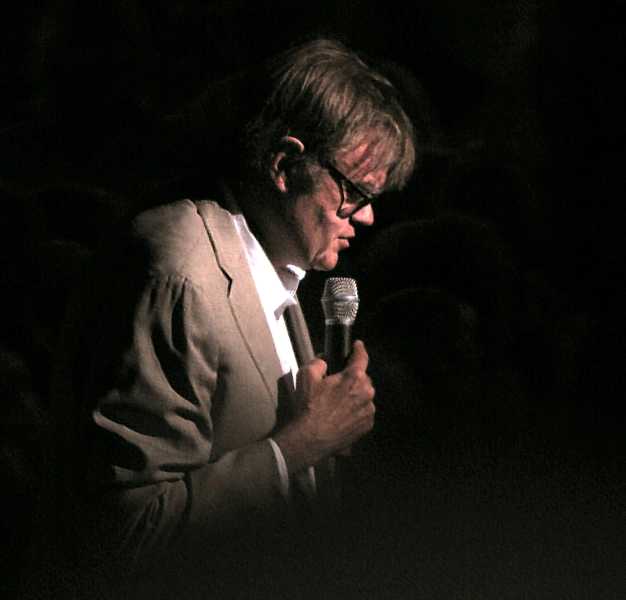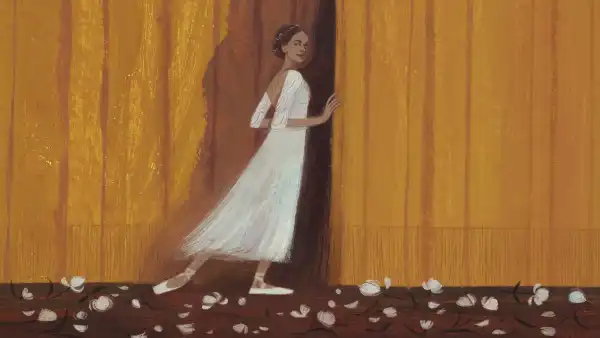What Keillor gave us that night was as meaningful as a talk by Jordan Peterson: an invitation to look at the world anew—with appreciation, gratitude, beneficence.

Credit: Dick Jensen
When Garrison Keillor takes the stage, he does not stride, march, or trot. At 81, he tends to shamble and meander, but his tottering manner does not seem to be the product of age as much as attitude: He is modest, good-natured, and self-effacing. One senses that, for Keillor, to bound onto the stage would be against good manners or something his mother once told him.
These virtues are all too rare in contemporary American popular culture, which is increasingly defined by a kind of abrupt combativeness. Politicians preach to us, celebrities tweet at us, comedians aim to shock and divide us. As it happens, Keillor would have more reason than some to be in a state of agitation: In 2016, he said so long to A Prairie Home Companion, the classic public radio program he created in 1974, but after a series of particularly weak and lame #MeToo-style accusations—one involving his writing a bawdy limerick—were leveled against him, he chose to reemerge on the public scene. Effectively exiled from the sort of mainstream media outlets to which he once had easy access, he has brought out several books published under his own banner, published and promoted the Prairie Home archives on his website and social media, and trekked across the country to perform for the remnants of his fan base.
What Keillor gives us, however, is not anger or resentment—even though he would be within his rights to be angry and resentful. Instead, Keillor has in mind a far humbler program. Yes, he tells tales of Lake Wobegon—the fictitious prairie town whose history he has elaborated for decades—but mainly he speaks in his own soft, murmured, muffled voice to offer reminiscences, counsel, and songs to anyone with a paying ticket.
As it turns out, Keillor’s disposition is ideally suited for a Christmas show—not the big, brassy sort, but one as tender and mild as the holy infant. The week after Thanksgiving, Keillor performed A Prairie Home Holiday at a Downtown theater in Columbus, Ohio. The evening was frigid, still, and dark—uninviting in the way that Ohio winters often are—but to those of us who had shed our coats and jackets to gather inside the theater, the message, and the man speaking it, emanated a kind of psychic warmth.
Its title notwithstanding, A Prairie Home Holiday is hardly a recreation of A Prairie Home Companion. There is no band and only a hint of a supporting cast. For most of the show, Keillor was joined only by vocalist Heather Masse and pianist Richard Dworsky, who served as the host’s musical partners and good-humored onstage foils. Nonetheless, the small-scale nature of the show—what one would charitably describe as its intimacy—was part of its DNA: like the barren, dying Christmas tree picked out by Charlie Brown, this stripped-down holiday show heightened and clarified the meaning of the season.
Keillor is described as a humorist, but he is no satirist: He spoke about nearly everyone and everything with a measure of gratitude, a degree of charity, and only the slightest bit of ribbing. Keillor, who now makes his home in New York City, said that he had flown into Columbus the previous night. He spoke highly of the relatively friendly TSA agents he had encountered at the airport—late afternoons and evenings being ideal times to fly, he added. He honored the heritage of his host city by alluding to the Columbus-born writer and cartoonist James Thurber, who, Keillor said, once described his brand of humor as being akin to “emotional chaos remembered as tranquility.” That insight captured some of Keillor’s attitude towards his own past: During the vintage years of Prairie Home, one could never fully discern whether he was embracing or sending up Lake Wobegonites, but now, in his senescence, there is no doubt that Keillor is devoted to the people from whom—and the place from which—he sprang.
He spoke of a paradisiacal upbringing in which he and his siblings were cared for but not sheltered. “We loved trauma,” he said. “We sang about it.” He then went through a deconstruction of the murder ballad “Frankie and Johnny,” which he had eagerly learned, but not fully comprehended, as a lad. He recalled a recent Proustian moment during which the act of unpeeling a fat orange and getting a whiff of its aroma sent his mind racing to his youth: As a boy, oranges were stuffed into the feet of stockings at Christmastime, and the scent brings back memories of Yuletides past.
He talked about cousins back home and the importance of avoiding what he termed “dangerous territory”—meaning, political disagreements. Intuiting that he was speaking to a left-of-center crowd, he highlighted certain words that indicated the imminent arrival of dangerous territory—words like “Deep State” and “woke”—but his message was sincere: He may scoff at the buzzwords of MAGA, but he seeks peace with those who speak them. If only all liberals bit their tongue to preserve familial bonds. “You have to stay with family,” he said, firmly. The message of the Lake Wobegon story Keillor told seemed to reinforce the same point: “If you can’t practice tolerance, practice ignorance,” says Pastor Liz of Lake Wobegon. When you are tempted to argue about current affairs, turn the other cheek.
Subscribe Today Get daily emails in your inbox Email Address:
And, in the midst of all this storytelling and sermonizing, Keillor sang. He egged on the audience to join in when he and Masse sang “My Country, ’Tis of Thee.” The duo—her sweet voice balanced his gruff bark—made their way through every sort of song, from Paul Simon’s “Under African Skies” to Van Morrison’s “These Are the Days” to Chet Atkins’s “I Still Can’t Say Goodbye.” And there were carols, too: “Silent Night,” “O Little Town of Bethlehem,” and, best of all, “Here We Come A-wassailing.”
The evening was entertaining, edifying, and even church-like. One cannot know the rate of religious observance of one’s fellow theater-goers, but given trends of declining church attendance, one can assume that, for some of us, it might have been our first time hearing carols performed in a communal setting in quite some time. It was for me. What Keillor gave us that night was as meaningful as a talk by Jordan Peterson: an invitation to look at the world anew—with appreciation, gratitude, beneficence. At the end of it all, he bade us farewell. “Merry Christmas, people!” he intoned.
Keillor would undoubtedly dislike this comparison, but on this night, during this show, he managed to do what a certain former president once took credit for: he got us all to say Merry Christmas again.
Sourse: theamericanconservative.com






